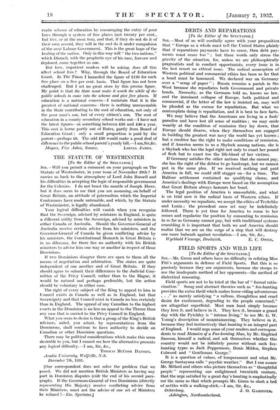THE STATUTE OF WESTMINSTER
[To the Editor of the SPECTATOR.]
Sus, —Will you permit a comment on your paragraph on The Statute of Westminster, in your issue of November 28th? It carries us back to the atmosphere of Lord John Russell and his difficulties in accepting the logic of responsible govermnent for the Colonies. I do not boast the mantle of Joseph Howe, but it does seem to me that you are assuming, on behalf of Great Britain, an attitude of paternalism which the Imperial Conferences have made untenable, and which, by the Statute of Westminster, is legally abandoned.
Your logical difficulties will vanish when you recognize that time Sovereign, advised by ministers in England, is quite a different entity from the Sovereign, advised by ministers in either Canada or Australia. Should the Governor-General of Australia receive certain advice from his ministers, and the Governor-General of Canada be given conflicting advice by his ministers, the Constitutional Monarch in Great Britain is in no dilemma, for there lies no authority with his British ministers to advise bins one way or another in respect of those Dominions.
If two Dominions disagree there are open to them all the means of negotiation and arbitration. The states are quite independent of one another and of Great Britain. If they should agree to submit their differences to the Judicial Com- mittee of the Privy Council, rather than to the Hague, it would be natural and perhaps preferable, but the action should be voluntary in either case.
The right of every subject of the King to appeal to him in Council exists in Canada as well as in England, but that Sovereignty and that Council exist in Canada no less certainly than in England. The appeal of any Canadian to the highest courts in the Dominion is no less an appeal to the Throne than any case that is carried to the Privy Council in England.
What you seem to desire is that a group of the King's British advisers, aided, you admit, by representatives from the Dominions, shall continue to have authority to decide on Canadian or other Dominion questions.
There may be political considerations which make this seem desirable to you, but I cannot see how the alternative presents any logical difficulty.-1 am, Sir, &c., December 7th, 1931.
[Our correspondent does not solve the problem that we posed. We did not mention British Ministers as having any part in Dominion disputes (vide the end of his second para- graph). If the Governors-General of two Dominions (directly representing His Majesty) receive conflicting advice from their Ministers, must not the advice of one set of Ministers be refused ?—En. Spectator.]






































 Previous page
Previous page